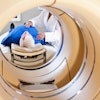NEW YORK (Reuters Health), Jun 14 - Amateur marathon runners who run less than 40 miles per week during training often show signs of cardiac dysfunction after the race and some of these abnormalities may persist for up to a month after they cross the finish line, a study shows.
"Running less than 40 miles per week prior to running a marathon leads to temporary heart muscle weakness and increased pressure in the lung arteries," Dr. Malissa J. Wood told Reuters Health. "Individuals who consistently ran greater than 45 miles per week showed no such signs of damage after completing the marathon."
The findings are based on a study of 20 amateur athletes who ran the 2003 Boston Marathon and underwent echocardiography (ultrasound imaging of the heart) prior to, immediately after, and about one month after running the 26-mile race.
The number of people participating in endurance sports has increased in the past decade, Wood, from Massachusetts General Hospital and Harvard Medical School, Boston and colleagues note in a their study, published in the European Heart Journal.
In the U.S. alone, nearly 480,000 runners completed a marathon in 2001. And while the benefits of moderate exercise on the heart are well established, the effects of more prolonged exertion are less clear. Some studies have suggested that cardiac dysfunction or "cardiac fatigue" occurs during prolonged exercise.
The series of echocardiographs obtained for the 20 amateur marathoners demonstrated "attenuation" of heart function after the race.
There was evidence of abnormalities in both systolic function (the heart's pumping ability) and diastolic function (the heart's ability to relax during beats).
All of the systolic abnormalities normalized fairly quickly, but the diastolic abnormalities persisted for up to one month after the race, indicating an inherent alteration in the heart's ability to relax, the authors note.
Wood and colleagues emphasize that their results do not pertain to elite athletes; "our group consisted of runners who ran on average less than 40 miles a week during training, a level that is most consistent with the 'average' marathon runner."
Their study also does not address whether this transient dysfunction damages the heart or if there are any long-term cardiac consequences.
By Megan Rauscher
Last Updated: 2006-06-14 11:30:29 -0400 (Reuters Health)
SOURCE: European Heart Journal, May 2006.
Related Reading
Prolonged exercise often leads to cardiac troponin T elevations, August 25, 2005
Playing their hearts out: Do young athletes need cardiac screening? August 16, 2006
Copyright © 2006 Reuters Limited. All rights reserved. Republication or redistribution of Reuters content, including by framing or similar means, is expressly prohibited without the prior written consent of Reuters. Reuters shall not be liable for any errors or delays in the content, or for any actions taken in reliance thereon. Reuters and the Reuters sphere logo are registered trademarks and trademarks of the Reuters group of companies around the world.

















